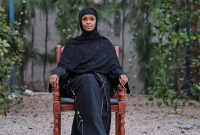Support strong Canadian climate journalism for 2025
An Iranian women's rights activist and film producer has lost her permanent residency and refugee status in Canada and now faces deportation and possible imprisonment in Iran.
“Anything can happen to me if I go back,” said Mahshid Ahangarani Farahani, who opposed the Iranian regime as a student activist before coming to Canada as a refugee in 2005. She won her claim and became a permanent resident in 2008 but, despite living in Canada for 20 years, never became a Canadian citizen.
“If you follow the recent news about Iran, we saw pictures of protesters being tortured, girls were poisoned in the school, women get killed, they get raped in the prison, and no one takes responsibility,” Mahshid said. “No one is there to even answer you.”
Mahshid’s refugee status was revoked last month after the Immigration and Refugee Board (IRB) found out she had returned to live in Iran, thereby reavailing herself of Iran’s protection. Mahshid says she had no idea she was endangering her status in Canada by travelling back to Iran.
Before 2012, a refugee found returning to their country of origin would have their refugee status removed but would not lose their permanent residency. After 2012, the Conservative federal government of the time amended the law, and now refugees who return to their country of origin lose all status in Canada and can be deported.
Mahshid was granted refugee status before these changes came into effect and didn’t know the law had changed.
Mahshid’s lawyers have filed for a judicial review in Federal Court, arguing the IRB should have considered her lack of knowledge about the change in the law and her intention in returning to Iran.
Hana Marku and Damey Lee, Mahshid’s lawyers, told Canada’s National Observer Mahshid has travelled back and forth between Iran and Canada over the past decade to help her sister in her legal battles with the Iranian regime. She provided support to her family when her sister was imprisoned in Iran’s infamous Evin Prison and helped produce films for her family’s company, Bamdad Film, and international filmmakers.
“The law of cessation in Canada is harsh and punitive, especially for people who continue to face risk in the country of persecution,” said Marku.
It does not require decision-makers to consider whether the person is still in danger, she added. “We have read many decisions where a refugee’s status is revoked only because they applied for a passport from the country of persecution and travelled on it.”
In Mahshid’s case, a decision was made to revoke her status with no consideration of the fact there is a warrant out for her arrest in Iran or the dangerous human rights abuses against Iranian women, Marku said.
Mahshid comes from a prominent, politically active family in Iran, according to a statement her lawyers sent to Canada’s National Observer. Her mother, Manijeh, is a renowned film director, and her sister, Pegah, is an actress. The three women have used their platforms and films to speak out against the Iranian regime for its treatment of women.
Films produced by Bamdad Film are banned in Iran. Through their work, Mahshid and her family have tried to show the world a true picture of what is happening to women in Iran, the Iranian regime’s human rights abuses and its horrible treatment of women.
“They have paid for their actions. Pegah was imprisoned by Iranian authorities, their office was raided and filmmaking equipment seized, they faced constant surveillance and interrogation, and Mahshid’s passport was seized, preventing her from leaving Iran for over a year,” Marku said.
Despite her fear, Mahshid felt compelled to return to Iran for the protection of her family and women’s rights in the country, said her lawyers.
“Women like me, who fought for justice for years, were banned from Iran, and the same thing happened here to me that I have to leave Canada,” said Mahshid. After returning from her last trip to Iran in 2019, she said she received a letter from the Canada Border Services Agency (CBSA) notifying her the removal order had been issued without any prior notice.
“I have been in the court for about three years now going back and forth but getting negative responses,” said Mahshid.
Despite being interviewed by the CBSA at Toronto’s Pearson Airport in 2019, no one informed her that she had violated any immigration laws by returning to Iran, she added.
Canada’s National Observer reached out to Immigration, Refugees and Citizenship Canada for comment but did not receive a response in time for publication.
Mahshid said she is terrified at the prospect of being deported to Iran. “I really don't know what will happen to me because me and my family have always been in danger.”
There is currently an outstanding arrest warrant for Mahshid in Iran. Her sister and mother fled Iran in 2020 for their own safety, and she has no one to rely on, said Lee, her lawyer.
“Mahshid and her family have dedicated their lives to speaking out against the Iranian regime. Their work has strengthened the voices of women in Iran and around the world. It is shameful that Canada pays lip service to supporting human rights in Iran while simultaneously trying to deport a woman who is a target of the regime. If she is deported, she will be silenced,” she added.
In recognition of the current humanitarian crisis in Iran, Canada has paused deportations of all Iranians to Iran, but Lee and Marku said this is only a temporary measure, and as soon as the situation stabilizes, Mahshid will be deported.
The situation for women in Iran has been a topic of concern for the Canadian government and international community for many years.
Iran has been gripped by protests since the death of Mahsa Amini, a 22-year-old Iranian woman of Kurdish origin who was detained by Iran’s morality police for failing to fully cover her hair with her hijab.
Hundreds of protesters have been killed, including at least 52 children, according to Human Rights Watch.
In response to Iran's deadly crackdown on protesters last year, the United Nations removed Iran from the UN commission on women, saying: “Iran’s membership at this moment is an ugly stain on the commission’s credibility.”
Canada imposed new sanctions against the Iranian regime in response to its gross and systematic human rights violations, which include its persecution of women.
This story was produced in partnership with Journalists for Human Rights for the Afghan Journalists-in-Residence program funded by the Meta Journalism Project.






Comments